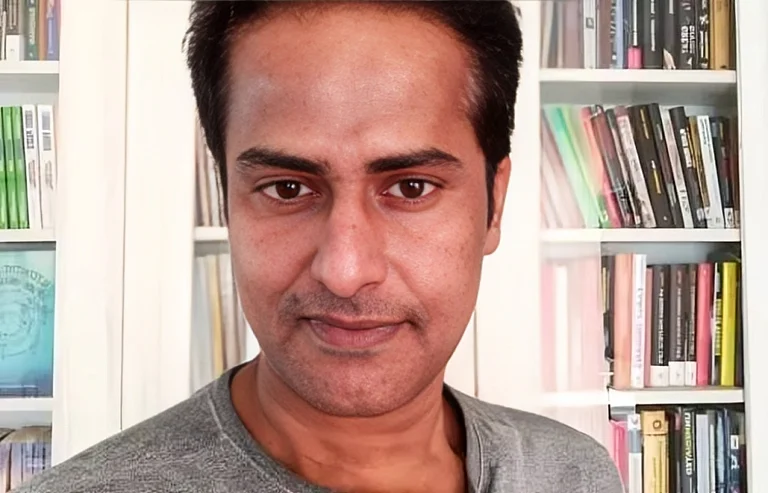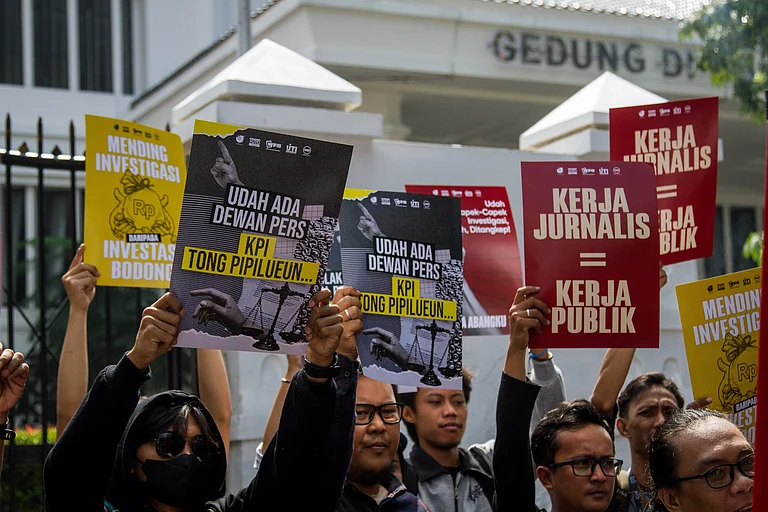Wael al-Dahdouh, an Al Jazeera correspondent renowned for covering Gaza throughout his career, has become a symbol of the territory's devastation amid the ongoing war.
After losing his wife, a son, a daughter, and an infant grandson in an Israeli airstrike in October, al-Dahdouh suffered another tragic loss on January 7 when his eldest son, Hamza, was killed in an Israeli attack that also took the lives of two journalists.
"Nothing is harder than the pain of loss. And when you experience this pain time after time, it becomes harder and more severe," al-Dahdouh told Al Jazeera, wishing that his son would be the last of the many killed in Gaza.

Al Jazeeras bureau chief in Gaza, Wael Al-Dahdouhs son Hamza Wael Al-Dahdouh and Mustafa Thuraya, who were also journalists are killed in an Israeli bombing on their car in the city of Rafah, Gaza on January 07, 2024. Getty Images
Al Jazeera has accused Israel of “violating principles of freedom of the press” and deliberately targeting the journalists.
The Israel-Gaza war has taken a severe toll on journalists since it began on October 7. As of January 9, 2024, the Committee to Protect Journalists (CPJ) reported that at least 79 journalists and media workers were among the more than 24,000 killed, with over 22,800 Palestinian deaths in Gaza and the West Bank and 1,200 deaths in Israel.
Jodie Ginsberg, the president of CPJ, stated, "The Israel-Gaza war has been the deadliest conflict for journalists that C.P.J. has ever recorded, in terms of documenting attacks on the press. That’s because it’s the highest number of journalists killed in a conflict in such a short period of time," in an interview with The New Yorker.
By one estimate, 1 out of every 10 journalists in the Gaza Strip has already been killed.
Challenges Faced by Gaza's Journalists
The challenges faced by journalists in the Gaza Strip extend beyond the direct casualties. According to CPJ, as of January 9:
79 journalists and media workers were confirmed dead: 72 Palestinian, 4 Israeli, and 3 Lebanese.
16 journalists were reported injured.
3 journalists were reported missing.
21 journalists were reported arrested.
Multiple assaults, threats, cyberattacks, censorship, and killings of family members.
The list of journalists who have lost their lives in the Gaza war can be found here- Journalist casualties in the Israel-Gaza war
Additionally, family members of journalists - including relatives of Al Jazeera's Gaza bureau chief and a CNN producer - have been killed in the bombardment. Over 50 media outlets in Gaza have had their premises hit.
The Israeli government has arrested more than a dozen Palestinian journalists in the West Bank due to their coverage and their social media posts about the conflict, some of whom remain in detention or house arrest, according to CPJ.
The Israel Defense Forces (IDF) told Reuters and Agence France-Presse that they could not guarantee the safety of journalists operating in Gaza after the news agencies had sought assurances that their people would not be targeted.
Under international law - Journalists are not a separate protected class from civilians overall. However, just as intentionally targeting civilians or failing to distinguish between military and civilian targets is illegal, so is intentionally targeting journalists.
Media cannot be considered military targets unless they make an "effective contribution to military action" or "incite war crimes, genocide or violence," according to the International Committee of the Red Cross.
Operating in the world's most challenging and dangerous environment for media, Gaza's few remaining journalists struggle both to report from the blurred, battered frontlines and to document their own daily efforts just to survive - from gathering water to finding internet access to mourning lost loved ones.


























